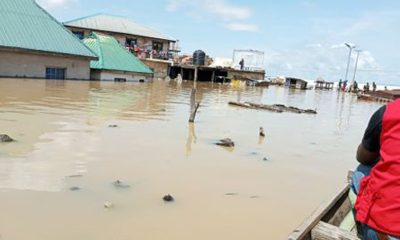Foreign News
Ghana Parliament Begins Public Hearings on Anti-LGBT+ Law

Ghana’s parliament on Thursday hold the first public hearing on a new law that would make it illegal to be gay or to advocate for gay rights, its press office said.
The so-called family values bill is currently before the Committee on Constitutional, Legal and Parliamentary Affairs, which said it had received more than 150 memoranda from individuals, groups and faith-based organisations on the bill.
The committee is expected to hear 10 petitions each week in a series of public sessions before the bill is put to a vote, deputy majority leader, Alexander Afenyo-Markin, said.
Gay sex is already punishable by prison time in Ghana, but no one has been prosecuted in years.
The new bill would go much further, criminalising the promotion and funding of LGBT+ activities as well as public displays of affection, cross-dressing and more.
Ghana’s speaker of parliament, Alban Bagbin, pledged in his opening address last month that parliament would pass the bill into law “at the earliest possible time’’.
U.N. human rights experts have urged lawmakers to reject it, saying it would establish a system of state-sponsored discrimination and violence against sexual minorities.
LGBT+ rights groups in Ghana said they have seen a spike in homophobic attacks since the draft law was introduced in August.
Arbitrary arrests, blackmail and evictions have more than doubled since then, with people targeted if they are suspected of being gay, said Danny Bediako, director of the human rights organisation Rightify Ghana.
“Our greatest worry is the health and safety of our community members,’’ he told Reuters.
“I have never seen so many people who want to leave the country.’’
The bill has been promoted by conservative Christian groups in Ghana, which has become a hot spot for the debate on LGBT+ rights in Africa.
The United States-based World Congress of Families (WCF), a group that works to advance anti-gay laws and policies around the world, held a major regional conference in Ghana’s capital Accra in 2019. (NAN)
Foreign News
51 killed by Severe Storms in Spain

At least 51 people have died in the severe storms in Spain, specifically in the Mediterranean region of Valencia, the Spanish news agency Europa Press reported on Wednesday.
The report cited the regional government in Valencia.
Torrential rain and widespread flooding have wreaked havoc across Spain, and several people are reportedly still missing, according to the authorities.
Rescue operations are ongoing in many areas.
The situation is particularly dire in the Mediterranean coastal regions of Andalusia, Murcia and Valencia, which are very popular with holidaymakers.
The regional leader of Valencia, Carlos Mazón, has called on residents to move to higher ground.
In some areas, residents were trapped in their homes and sent emergency messages via social media, the newspaper El País reported.
In addition to heavy rainfall, there was also hail and strong gusts of wind, according to the national weather service AEMET.
“The hailstones were the size of golf balls. It seemed like the end of the world,’’ farmer Mercedes González, 46, told El País.
The storms have caused rivers to overflow, flooding streets, homes, and fields, with cars and trees swept away by the floodwaters.
The area of rain is expected to move north-east today.
However, a severe weather warning remains in place for large parts of the country.
The weather service said that the situation across Spain would not fully calm until Thursday.
In the south and east of Spain, motorways and rural roads had to be closed in many places.
Air and rail transport were also affected. Classes were cancelled at numerous schools and universities.
Due to a landslide, a high-speed train travelling from Málaga to Madrid derailed shortly after departure with 291 passengers on board.
However, there were no injuries reported, Spain’s state-owned railway Renfe said.
The storm with heavy rain had already hit Mallorca and other Balearic Islands on Monday.
The situation there has eased, although a yellow storm warning was still in force for some areas, including Mallorca.
Heavy rainfall events have become more frequent and intense worldwide, largely due to climate change.
As global temperatures rise, warmer air holds more moisture, leading to increased precipitation levels.
However, flooding is not solely a result of changing weather patterns.
Other human activities, such as urban development, deforestation, and inadequate infrastructure, also contribute significantly to flood risks. (dpa/NAN)
Foreign News
WHO Accuses Israel of Denying Medical Specialists’ Entry to Gaza

The World Health Organisation (WHO) has accused Israel of barring medical specialists from entering Gaza to support clinics in the besieged enclave.
The WHO said since August, eight organisations and over 50 specialised personnel had been affected by Israel’s blockade.
The specialists were intended to provide crucial support for various medical services, as well as psychological support for healthcare workers at facilities including the European Gaza Hospital and the Nasser Hospital, the WHO said.
It was reported that among the organisations denied entry was the U.S.non-profit Palestinian American Medical Association, which supports Palestinians in need of medical care.
According to the WHO, this marks the first instance in which Israel has denied entire organisations the ability to participate in relief efforts for the Gaza Strip.
The WHO reported that in the past week, support teams conducted 25 per cent fewer operations than usual.
With only 17 out of 36 clinics and 43 medical practices remaining partially operational, the WHO emphasised the irreplaceable role of these external teams in providing essential medical services.
The WHO called for full access for emergency aid teams. (dpa/NAN)
Foreign News
Germany must Ensure Ukraine War Does not Spread to NATO – Scholz

It is Germany’s responsibility to make sure that a war between Russia and Ukraine does not become a war between Russia and NATO, German Chancellor Olaf Scholz.
He said this as he repeated his “nein” to sending long-range weapons to Kiev.
“I don’t consider this to be a proper delivery and that’s how it will stay,” Scholz said after a European Union summit in Brussels.
Scholz rejected key points in Ukrainian President Volodymyr Zelensky’s “victory plan” out of concerns of future escalation.
Zelensky presented his “victory plan” at the meeting and called on Scholz, again to send him Taurus cruise missiles.
The Ukrainian leader believes a deterrent missile arsenal could force Russia into peace negotiations.
Scholz also maintained his stance against a quick invitation for Ukraine to join NATO, as outlined in Zelensky’s plan.
The United States also opposes a fast-track NATO entry for Ukraine.
The chancellor referred to the resolutions of the most recent NATO summit in Washington, which offers Ukraine a general assurance that it could no longer be stopped on its way into the defence alliance.
He further said all allies must agree that NATO conditions are met for an invitation.
These include reforms in the areas of democracy, the economy and the security sector.
Scholz also used the occasion to take a swipe at his main opposition in the Bundestag or German parliament, Christian Democratic (CDU) leader Friedrich Merz.
He complained that Merz flip-flopped on Taurus deliveries, taking a no-delivery position before key elections in east Germany and changing his position after that. (dpa/NAN)



















